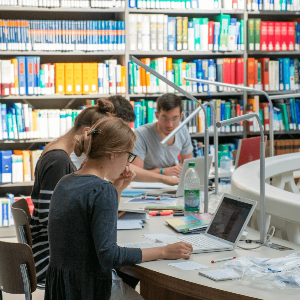Final Theses
Seven steps towards your thesis...

Seven steps towards your thesis...

In general, you can start your bachelor thesis if ...
For master's thesis, no formal prerequisites.
Please pay close attention to the Information and Service Center Wirtschaftswissenschaftliche Prüfungen (ISC) for the PStO 2008 and PStO 2015.
When assigning bachelor theses, we give preference to students who have demonstrated interest in our topics. Students increase their chances when they
Note: The choice of the latter may, but does not have to coincide with the (advanced) seminar, which generally entitles you to write a Bachelor thesis according to PStO 2008 or 2015 (see step 1).
For master's theses, preference is given to students who have successfully participated in
Before contacting us, we encourage you to compare your personal interests with the list of possible topics for final papers. Please find information on current research projects of our academic staff on our website.
Based on step 3, consider which topic(s) you would be interested in. Send your preferences to isto.thesis@som.lmu.de. We will then find a suitable supervisor for you.
Please also submit the following documents:
Based on your preferences, we will try to find a supervisor whose research best suits your interests. In a preliminary talk, the supervisor proposes different topics, and you will be able, if applicable, to incorporate your ideas. In the wake of this conversation, we will ask you for a one to two-page sketch on the subject as well as an overview of relevant literature. In particular, this should emphasize your contribution to the current state of research.
The thesis is registered with the Examination Office at the latest four weeks after agreement on the topic. The deadline for submitting the work is determined at the time of registration. Please agree on a title with your dedicated thesis supervisors, fill out the form, print it, and sign it. Submit this form to ISTO in person or via the mailbox. Registration form (XLSX, 66 KB)
We recommend that you write your thesis in English. Please adhere exactly to our formal guidelines. Make sure to ask formal questions (PDF, 330 KB)to your supervisor at an early stage. Students writing a final thesis at ISTO are required to present their work at the Institute's internal Thesis Colloquium. The aim of the presentation is to provide students with constructive feedback on their work. The presentations are each ten minutes long, followed by about ten minutes of feedback, and are held in English. These should usually reveal the status of the work, open questions, and further steps, and in particular elucidate the research question and methodology.
Make sure you know the formal requirements of the Examination Office (ISC). Please hand in the required number of copies of your thesis independently and on time to the Examination Office and inform your supervisor about your planned filing date. Further information and forms (available in German only)
Supervised topics for final theses
My research focuses on platform governance and platform regulation, with particular interest in the interactions between platforms and complementors. I am also interested in how complementor heterogeneity shapes their value creation for the platform and their coopetition dynamics. I use quantitative methods such as quasi-experimental designs to conduct the research.
I supervise quantitative theses on related topics and welcome discussions about potential research ideas.
Svenja Friess (s.friess@lmu.de)
My research focus lies at the intersection of behavioral economics and organizational studies. In particular, I study behavioral foundations of innovation processes, (digital) knowledge transfers across individuals, and (gender) inequality in strategic organization behaviors. I use experimental and quasi-experimental methods to study these phenomena empirically.
I supervise quantitative and experimental bachelor's and master's theses on the abovementioned topics. Students are welcome to propose closely related topics and alternative methodologies.
Denzel Glandel (Denzel.Glandel@lmu.de)
My research interests lie in the demand-supply dynamics of digital platforms, particularly those in the education and career development industries and those related to content creators. I am also interested in how organizational structure and governance strategies influence the success of these platforms and their complements.
I primarily supervise quantitative bachelor theses on these topics, but I am also open to related topic suggestions.
Sophia Wetzler (s.wetzler@lmu.de)
My research focuses on online communities (e.g., Q&A forums, Wikis, gaming communities), online community governance, and engagement dynamics. My current work encompasses interpersonal (e.g., conversation analysis) and inter-community dynamics (e.g., membership overlap, migration, competition). Key questions include how communities can sustain engagement and coordinate collaborative projects, and what factors contribute to their resilience during a crisis. I primarily supervise quantitative bachelor's theses, but I am also open to related topic suggestions involving qualitative research methodologies (e.g., case studies, surveys, literature reviews).
Frederike Eulitz (f.eulitz@lmu.de)
My research focuses on platform governance, particularly how platforms shape the behavior of their participants. I am also interested in the dynamics between user groups and platforms, and how these relationships are influenced by governance mechanisms. In addition, I study online labor markets from the perspectives of platforms, strategy, and organizational design.
I primarily supervise quantitative bachelor’s theses on these topics, but I am also open to related topic suggestions and other methodological approaches, such as literature reviews.
JUNIOR MANAGEMENT SCIENCE - the academic journal for theses in business and management studies!
JUMS is the academic journal to publish outstanding theses in business and management. The anonymized thesis runs through a review process and will be published afterwards. JUMS is accompanied by over 50 professors of more than 30 universities.
Is your thesis one of the best in business studies and management? Submit your thesis and receive valuable feedback by top academics. Your thesis can be quoted and is accessible worldwide. Make your result and knowledge acessible to both academia and society. Additionally, you will receive two reports, helping you to improve in the future.
Your thesis in business and management is written in english or german?
Submit for free: www.jums.academy/en/submit